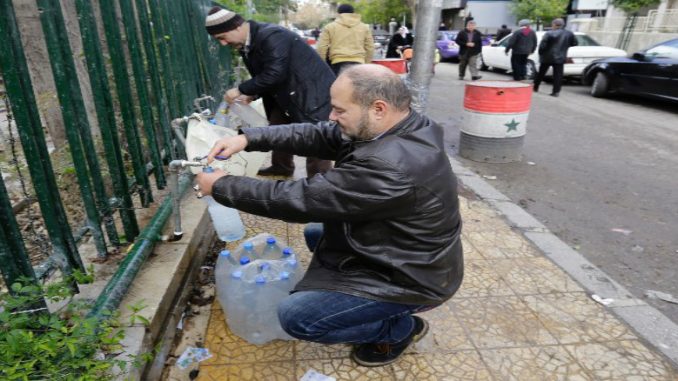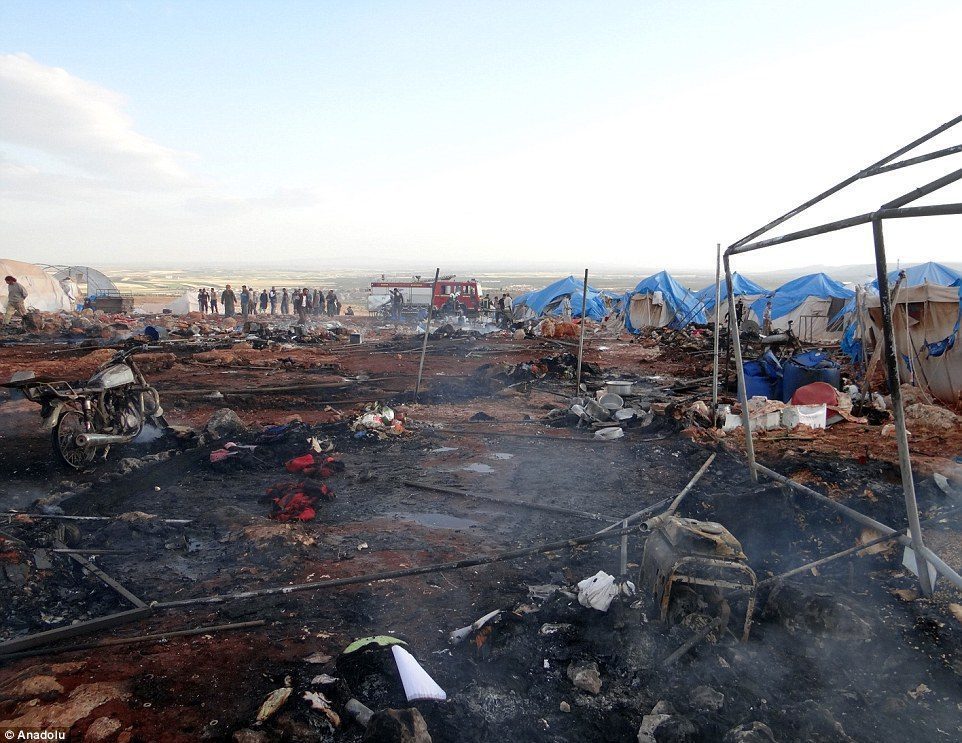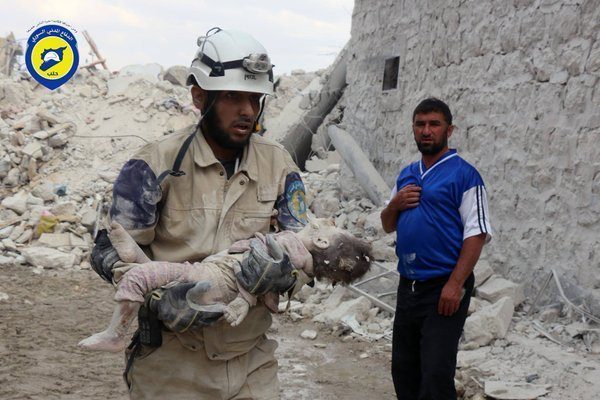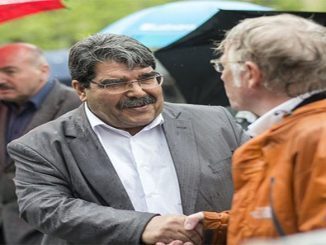
Sources said that government workers have entered Wadi Barada area near Damascus to begin restoring water to the capital after weeks of shortages due to the military operations there.
Assad regime forces backed by Hezbollah and Shia militias have launched the attack on Wadi Barada valley since 22 December, with daily bombing and air raids on the area. The water in Damascus has been cut ever since.
Rebels say the army is seeking to recapture the area, where a major spring provides most of Damascus’s water supplies and which lies on a major supply route from Lebanon to the Syrian capital used by Hezbollah.
The daily clashes are associated with heavy shelling operations by the regime forces using tanks, artillery and mortar shells, and the launching missiles believed to be ground-to-ground, along with airstrikes by warplanes and the barrel bombs of the helicopters, which left tens casualties and injuries
The government assault has coincided with a severe water shortage in Damascus since December 22. Images from the valley’s Media Center indicate its Ain al-Fijeh spring and water processing facility have been destroyed in air strikes.
Rebels say the government bombed the water pumping station at the start of the campaign, while the government says rebels spoiled the water source with diesel fuel, forcing it to cut supplies to the capital.
Wadi Barada has been surrounded by government forces since mid-2015, but the siege was tightened in late December as the army piled on pressure seeking to secure a “reconciliation” deal.
It has won several of these deals in opposition areas around the capital, offering safe passage to surrendering rebels in return for retaking territory.
#وادي_بردى #WadiBarada
صور لنبع #عين_الفيجة الذي يعتبر مصدر مياه الشرب الرئيسي لسكان العاصمة #دمشق قبل و بعد إستهدافه من قبل قوات النظام pic.twitter.com/9CRDAcHKH6— وادي بردى (@w_barada) December 26, 2016
#WadiBarada
(هام)
لحظة إلقاء البراميل المتفجرة على قرية #بسيمة في #وادي_بردى | 10 يناير 2017#أنقذوا_وادي_بردىhttps://t.co/TAYzEdFlqk— وادي بردى (@w_barada) January 11, 2017
Assad regime forces advance
The Syrian observatory of Human Rights said that the area witnessed a surge in violence during the past days.
The Assad regime forces, backed by Hezbollah militia, continues their assault on the area and escalated the artillery and missile shelling on areas in the villages of Ain al-Fijah, Baseimah and other areas in the valley, amid intense airstrikes that targeted the same places. At the same time, they tried to push on the ground against the rebel forces.
According to sources close to Assad regime, the 42nd Brigade of the 4th Mechanized Division, the Armed Forces, and Hezbollah began the day firing several anti-tank guided missiles (ATGM) on the besieged areas.
Syria’s army and its allies advanced near Damascus on Friday according to the Syrian Observatory of Human Rights.
The army and the Lebanese Shi’ite Muslim militia Hezbollah gained complete control of the town of Baseimah, taking them close to Ain al-Fijah where the water springs are located, the Observatory said.
A cease-fire that went into effect on Dec. 30 was threatened by the ongoing violence. Rebel groups threatened to withdraw from planned talks because of the violations.
However, this advance forced the rebels to accept a conciliation with the regime.
A ceasefire in Wadi Barada reached
Sources said that the regime and rebel forces have reached a deal to allow the repair teams to enter the area in return to halt the military operations and the bombing.
By late Friday afternoon, however, the opposition Wadi Barada Media Center posted pictures of maintenance equipment arriving in the water-rich Barada Valley.
The engineers had entered the facilities at Ain al-Fija in the opposition-held Wadi Barada area by agreement with the rebels, the governor said on Ikhbariya channel on Friday.
“We have halted military operations in Ain al-Fija and started reconciliation with the militants there,” said provincial governor Alaa Ibrahim, speaking to reporters from an area near the spring.
“God willing, the pipe will be fixed within three days … rapid measures will be taken to get water to Damascus tomorrow,” he added.
The Observatory confirmed that repair crews had reached the Ain al-Fijah spring and that the Syrian flag had been raised in the area.
#وادي_بردى
دخول ورشات الكهرباء والمياه قبل قليل من #دير_قانون بإتجاه #عين_الفيجة لبدء عمليات الصيانة مع بدأ تنفيذ وقف إطلاق النار منذ ساعات pic.twitter.com/k8Baozc76t— وادي بردى (@w_barada) January 13, 2017
However, contradicting news about the deal was published.
Fuad Abu Hattab, an exiled resident of Barada Valley who is part of the opposition group following the talks, said the agreement would not force anyone to leave the valley nor mean Syrian soldiers taking control of the area. The maintenance equipment would enter the area accompanied by civil police to protect it, he said.
But briefing reporters, local governor Alaa Ibrahim said fighters would hand in their weapons and that those who refused would be move to Idlib province — the opposition stronghold in the north.
The Observatory, which relies on a network of activists on the ground, also said only policemen would protect the station and that rebel fighters would remain.
Shortly thereafter, reports emerged that shelling and fighting had resumed in the area. It was not clear if the maintenance crew had withdrawn. But with darkness setting in, it was unlikely maintenance would take place.
The Wadi Barada media center said later that the teams reached Ain al-Fijah after the bombing stopped, and they started their repairment work hoping to restore water by morning.
The ceasefire is intended to pave the way for new peace talks in the Kazakh capital Astana, which Russia confirmed on Wednesday were scheduled for January 23.
#الهيئة_الإعلامية_Barada
الورشات تبدأ إصلاح قناة مياه الشرب في #وادي_بردى عقب خروقات النظام | 13 يناير 2017مhttps://t.co/7JWwYX8Eyw— وادي بردى (@w_barada) January 14, 2017
The Syrian crisis began as a peaceful demonstration against the injustice in Syria. Assad regime used to fire power and violence against the civilians and led to armed resistance. 450.000 Syrians lost their lives in the past five years according to UN estimates, and more than 12 million have lost their homes.



